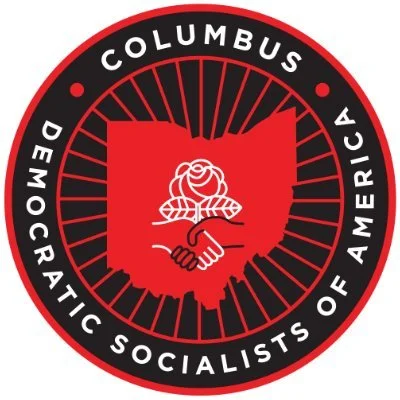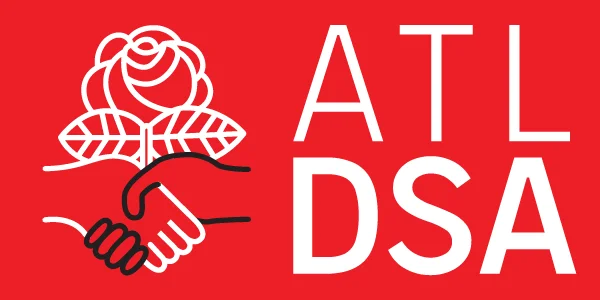

Let’s Make a Columbus for the Working Class—Electing Liliana Rivera Baiman is Step One

I’ve been interested in politics for several years now, reading about it, talking about it (to friends and family), donating some money, and voting. But, I’d never found a candidate who excited me enough to do more. That is until I learned about Liliana Rivera Baiman’s run for Columbus City Council — then that all changed.
She’s the candidate who finally made it seem worthwhile to get off my ass and do something more.
Trust me, there aren’t many people who, for several months, I’d dedicated at least one day each weekend to spread the word about, but Lili is that person.
So, what makes Liliana Rivera Baiman such a great—and groundbreaking—candidate? Well, I could go on about this for a while (as my friends, family, colleagues, and, honestly, anyone I talk to in the city would all tell you).
She’s the candidate who finally made it seem worthwhile to
get off my ass and do something more.
She is a candidate that actually cares about working-class people in our city. And, she has the experience (and endorsements) to prove it. As a former union organizer, she knows how crucial it is that workers have the power in a workplace. Recently, several city-funded projects have had upper-level union busting going on, and our current city council doesn’t seem to care whether employers are respecting their employees.
I don’t know about you (though, I can make some guesses if you’ve made it this far), but I don’t want corporations and employers setting the terms and conditions for workers. They’ll always choose what’s best for their bottom line. I want a council member with union experience to put our needs first. That’s all part of her platform focused on the fact that everyone should only have to work one job to lead a comfortable and dignified life. Don’t take my word for it, though. Lili has laid it out clearly.
As a member of Columbus DSA’s housing committee, tenants’ rights and affordable housing are crucial platform requirements to garner my support. Lili is exactly where she needs to be here. She wants to prioritize working people and families over developers. And, come on, do we really need more luxury apartments and condos in the Short North? (The answer to that is a resounding no.) She wants to focus on making sure everyone has access to safe, affordable housing and the tenant power to stop landlords from taking advantage of renters. I have no doubt that getting her on the city council would be a great first step to enacting local policies that benefit Columbus tenants. She’s not taking developer money, so she’s not beholden to them once she gets elected. This is a great first step toward transformational change.
When I mark the box by Lili’s name on the ballot this November,
I’ll be thinking about all the ways she’s going to help those in the city who actually need it.

And, with my background in education, it’s necessary to me that a candidate is committed to improving the funding of our public schools—and Lili is that candidate. I know I’d much rather have a corporation’s taxes used to fund education instead of giving these super-rich corporate bosses a financial break through decades-long tax abatements. These luxury developers displace long-time residents—and get rewarded for it. This is unacceptable. By electing Lili, we can take steps toward stopping this racist and classist gentrification in our city and put this money toward the people who really need it: Columbus kids. Our current city council members would rather give millionaires a bigger paycheck and screw over public-school students (and get their big-money donations as a result) than support our teachers, communities, and children.
When I mark the box by Lili’s name on the ballot this November, I’ll be thinking about all the ways she’s going to help those in the city who actually need it. That’s why I’m happy to call Lili a comrade, that’s why I’m happy to spend my weekends working to get her elected, and that’s why I’m proudly casting my vote for Liliana Rivera Baiman for Columbus City Council.
This is why I’m voting for Lili.
Election Day is November 5. Early voting has already started.
So, get out there and vote for candidates who care about the working class.


RPM Underground: Decolonize This Place!
You’re listening to Revolution Per Minute on listener sponsored WBAI in NYC broadcasting at 99.5 FM and streaming on your favorite podcast app. To connect with us after the show you can email us at revolutionsnyc@gmail.com or sign-up for our newsletter to get links to what we talk about on the show. You can do that on at our website revolutionsperminute.simplecast.com. You can also find us on twitter @nycRPM.


MADSA Endorses Andrea Cervone for Clarkston City Council
At our October 26th meeting, Metro Atlanta DSA voted to endorse member Andrea Cervone in her re-election campaign for Clarkston City Council. In her time on City Council, she has helped build Clarkston into one of the most progressive cities in the South. In this election, she hopes to win a mandate to broaden the coverage of Clarkston’s non-discrimination ordinance to protect workers on housing assistance; to extend the right to vote in municipal elections to all lawful residents, not just citizens; and to expand the city’s recently piloted participatory budgeting program.
MADSA members plan to help canvass for Andrea in Clarkston on Sunday, November 3rd, ahead of the November 5th election day. MADSA chair Councilman khalid, who serves on the City Council of South Fulton, said he hopes MADSA can become a strong voice in local politics while also continuing our efforts for Bernie Sanders’ presidential candidacy. If you’re interested in running for office or helping with MADSA’s electoral work, contact the electoral committee via email at electoral@madsa.ga.
(MADSA electoral committee breakout session at meeting. Photo: Reid Freeman Jenkins)



RPM Underground: Bernie is Back
You’re listening to Revolution Per Minute Underground on listener sponsored WBAI in NYC broadcasting from the occupied studios and streaming on your favorite podcast app. To connect with us after the show you can email us at revolutionsnyc@gmail.com or sign-up for our newslettser to get links to what we talk about on the show. You can do that on at our website revolutionsperminute.simplecast.com. You can also find us on twitter @nycRPM.


Daniel Soyer on Jewish Labor Bund History in Europe and America (Part II)


Solidarity with TransOhio
The Columbus chapter of the Democratic Socialists of America stands in solidarity with TransOhio, and all others who have chosen to side with marginalized communities, in ending their partnerships and relationships with Stonewall Columbus.
It is easy to acquiesce to power, to side with the oppressors instead of the oppressed. It is easy to let our allies continue to make choices that contribute to the marginalization of those in the community, to not “rock the boat.”
Queer and trans people of color experience among the worst institutional oppression in Columbus, with the assaults on and arrests of the Black Pride 4 being an egregious example. It is, however, certainly not the only example, with so many in our city continuing to experience the brunt of structural violence every day.
When an institution like Stonewall Columbus decides to side with the powers-that-be — the police and the penal system — they do a monumental disservice to all the queer and trans people of color who did so much work in building the LGBTQ+ Rights movement, historically and today. Our struggles for liberty, equality, and solidarity are fundamentally tied together, and to side with the oppressor in any of them is to side with the oppressor in all of them.
It is our duty and our honor to stand with BQIC, TransOhio, and all who fight against the entrenched institutions of racism, sexism, transphobia, and homophobia. It is our duty and honor to stand with all who pursue a freer, more just society.


Socialists in 1911, and Socialists Today
These are heady times for Columbus DSA! We’ve got a member running for city council, Liliana Baiman, who promises to deliver real socialist policies to help people in a city whose leadership has been content to ignore them. This is part of a rising tide nationally that has seen new leftist leadership on city councils, in state legislatures, and even in Congress.
In the midst of this period of increasing electoral activism, it is worth remembering that this is not the first time socialist candidates have done well at the ballot box in Ohio. At the turn of the twentieth century, the Socialist Party presented a viable challenge to the two-party system in the state and nationally. They campaigned on policies that with hindsight seem commonsense: referenda, public control of utilities, and progressive taxation. For a time, their campaigns were effective. In 1911, the Socialist Party in Ohio elected twelve mayors, four city-councilmen in Columbus, two in Dayton, and one in Toledo. Difficult as it may be to believe, Lima had a socialist mayor for a few years.
The culmination of this, which was likely more important than the mayoralties and city council seats, was the state’s constitutional convention. Ohio was dominated by a Republican political machine that tried to block municipal reform if it deviated with party orthodoxy. Socialists became a major part of the progressive coalition that supported a state convention, and while no new constitution was created, thirty-three amendments were added to the state constitution. Amendments gave the state the power to regulate state industries, created a workers’ compensation system.
And yet, within a few years the Socialist Party had declined in Ohio and nationally. Why did the Socialists decline so quickly after 1911? Part of it was simply co-optation: both Democrats and Republicans adopted parts of the Socialist platform. Socialists had created a critical mass that led to new policies, but once some of those policies were adopted, socialists had little to distinguish themselves between the Republicans and Democrats. The Bolshevik Revolution, the Sedition Act, and the First Red Scare created a backlash against leftists of any stripe. Some of the votes cast for socialists were no doubt protest votes against a two-party system that had been unresponsive for too long, with equally weak candidates. Lima’s socialist mayor spent more time trying to close saloons than he did fighting capital, which may have been why he only lasted two years in office.
As we get close to this election and the return of a socialist to the Columbus City Council, there are things we can learn from this earlier period of history. It is not simply enough to be elected to office, as some officeholders hoped over a hundred years ago. Nor can it happen solely by improving the state’s constitution or other administrative solutions. Hopes that access to initiatives and recalls would create socialism did not pan out, as referenda and initiatives can be deeply regressive (remember, a majority of British voters actually opted for Brexit). Merely providing legal machinery and framework cannot by itself create a more just society. Civic reform, while desperately needed, was not sufficient to sustain a democratic socialist movement the issues were too abstract to sustain socialism and needed a strong connection to working people’s lives.
For all of those warnings there were very tangible successes that should serve as lessons, too. Socialists managed to drag both Democrats and Republicans into supporting positions they had previously paid no attention to. In this sense, they shifted political norms in the direction of socialism. In the early 1900s, this was over public control of streetcar companies and utilities providers. Today, we’re fighting back against the same companies charging outrageous submetering fees.
In a lot of ways, Lili’s fighting the same battles that Ohio’s socialists were fighting a century ago. She’s taken aim at the problem of big money in politics, because Columbus City Council has been too eager to give away tax abatements that only benefit developers. The socialists of the Class of 1911 fought for a minimum wage and won one; now, Liliana’s fighting to update it. Socialists then fought against exploitative private streetcar fares, and Liliana wants to bring rail service (back) to Columbus.
Despite the numerable challenges socialists have faced over the decades, one thing has stood true through time: local activists tip the scales. After World War II, attention to local issues faded away in many cases. Today, however, when the federal government is gridlocked and we are once again led by strikingly unresponsive parties, it is worth remembering that local activism can deliver and make people’s lives better. Every Saturday, we’re canvassing for Lili, and we hope to see you before November 5th.


RPM Underground: Medicare for All
You’re listening to RPM Underground on listener sponsored WBAI in NYC broadcasting from the occupied studio and streaming on your favorite podcast app. To connect with us after the show you can email us at revolutionsnyc@gmail.com or sign-up for our newsletter to get links to what we talk about on the show. You can do that on at our website revolutionsperminute.simplecast.com. You can also find us on twitter @nycRPM.


Statement of Solidarity with the Graduate Teaching Fellows Federation
The administration at the University of Oregon has increasingly shifted more work to graduate employees (GEs). GEs do research, teaching, and grading, some of the most important work at the university. However, they remain some of the lowest paid employees. This is why the Graduate Teaching Fellows Federation (GTFF), the union representing GEs, deserves a fair contract.
The GTFF has been bargaining for nearly a year now and the UO administration is still giving them a paltry contract offer. The university is providing raises that do not keep up with the cost of inflation, as well as planning to dangerously cut the amount of money it provides for healthcare.
Meanwhile, the UO administration has given itself multiple raises. UO President Michael Schill received a 9% pay raise for this year, a full three times what the union is asking for GEs. That sets his salary at $720,000 per year, the equivalent of 45 GEs
Eugene Democratic Socialists of America stands with GTFF in bargaining for good wages and healthcare. If they go on strike we will stand with them on the picket line.


Marching With Pride
MADSA members again marched with our banner and signs in Atlanta’s massive LGBTQ Pride parade, despite scattered showers, as thousands cheered from the sidelines. Photos: Michael Roberts
